
News Story
Dive more into the performances in this year's programme with these great reads that inspired some of their creators.
100 Poems on the Underground sung by the National Youth Choir Scotland
Poems on the Underground was founded in 1986 to bring poetry to new audiences by putting it under our very noses – namely publishing hundreds of poems in-between the adverts and maps on tube carriages across the London Underground.
The highly regarded Scottish composer Thea Musgrave was so inspired by this project that she wrote three settings using some of the verse that appeared on the tube, one of which will be performed at the International Festival by the National Youth Choir Scotland. “On the Underground Set 2” uses Robert Herrick’s short but evocative piece “Dreams” and Edwin Morgan’s macabre invention “The Subway Piranhas” – both can be found in 100 Poems on the Underground, which collects some of the project’s work into one volume.
Katie Mitchell interrogates the male gaze in La Maladie de la mort
Marguerite Duras’s erotic and tragic novella meditates on the gap between two strangers attempting to love, wrought impossible to cross by one person’s individual suffering and pain. A man pays a woman to stay with him in a hotel by the sea, where he hopes that by spending time together he will learn to love again. After several days, the woman informs him that he will never love or be loved because he is afflicted, she says, with “the malady of death”.
The text’s second-person narrative (the man is referred to as “you” and the woman as “she”) is one jumping-off point for the Théâtre des Bouffes du Nord's new live film/theatre adaptation being brought to the International Festival 2018. British director Katie Mitchell and playwright Alice Birch scrutinise the novella through two contemporary feminist lenses, dissecting the male and female gaze in cinema while reframing the text for a modern audience.

En finir avec Eddy Belleguele transformed for the stage as The End of Eddy
Édouard Louis’ novel straddles the border between fiction and memoir to tell the story of Eddy, who reckons with a visceral masculine culture and homophobic bullying whilst growing up in the impoverished French village Hallencourt.
The novel has polarised opinion since its publication date in 2014. Within a year it became a bestseller with over 300,000 copies sold, but was also accused of portraying the working-class community without nuance. In response, Édouard states that the culture he describes is a direct result of the post-industrial decline and unemployment that has been forced upon the community. “When you’re subjected to endless violence, in every situation, every moment of your life,” he told an interviewer, “you end up reproducing it against others, in other situations, by other means”.
The UK’s leading youth theatre company, Unicorn Theatre, and Scotland’s Untitled Projects’ team are teaming up to bring the novel to the stage, giving the story a new immediacy for this year’s festival.
Cendrillon, the fairy tale inspiration for La Cenerentola
There are more versions of the Cinderella story than you could count, but the one that has influenced Western interpretations the most is Charles Perrault’s Cendrillon. It was Perrault who introduced elements like the glass slipper, pumpkin, and fairy godmother, now considered quintessential to the plot.
He published his new version in Tales of Mother Goose, where he set down folk tales that had previously been passed on by mouth in France’s rural communities. Perrault removed the oral tradition’s darker elements, adding moral messages and making the stories more palatable and instructive for children. He is credited as being one of the founders of the modern fairy tale genre.
Rossini’s La Cenerentola turns his story on its head again at the festival, where magical devices like the glass slipper and fairy godmother are replaced by a dizzying whirlwind of disguises played out by the Prince, his servants, and our heroine Cenerentola.

Poems by Mary, Queen of Scots sung by Catriona Morison with pianist Simon Lepper
Winner of 2017’s BBC Cardiff Singer of the World competition Catriona Morison and the celebrated pianist Simon Lepper will join this August in a rendition of Schumann’s Gedichte der Königin Maria Stuart.
In these final songs that he composed at the end of his career, Schumann set several poems written by the hapless queen Mary Stuart, each marking a pivotal (and frequently tragic) moment in the young queen’s life. Her departure from France, the birth of her son, and her last farewell before her execution are all rendered in a touchingly melancholy song-cycle, which Schumann wrote shortly before being incarcerated at an asylum in Enderich. The poems were most likely chosen from Gisbert von Vincke's translations in Rose und Distel: Poesien aus England und Schottland.